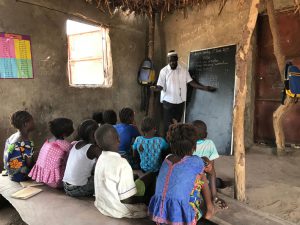ABU DHABI / WAM
Childhood experts and specialists from Columbia University emphasised the importance of the UAE initiative launched by the General Secretariat of the Khalifa Award for Education, an institution under the Erth Zayed Philanthropies, highlighting its global significance in advancing early childhood care and empowerment.
The initiative, the first of its kind worldwide, aims to promote best scientific and practical approaches to early childhood education and development.
During a scientific symposium organised by the award’s secretariat, experts from Columbia University commended the recognition of their project, “Developing Reading and Math Skills in Low-Income Environments,” which received the Khalifa International Award for Early Learning in the latest cycle.
Implemented in The Gambia by the Effective Child Protection Intervention Organisation, the project represents a significant step in combating learning poverty in low-resource settings and offers valuable insights for governments striving to improve early education in underserved areas.
The symposium featurd presentations by Professor Steven Barnett, Awarding Committee Chairman and Professor of Early Childhood at Rutgers
University in the United States; Dr. Alexander Ebel, Associate Professor of Economics of Education at Columbia University; and Professor Nishith Prakash,
Professor of Public Policy
and Economics at Northeastern University, US; and members of the project’s organising committee.
Professor Alex expressed Columbia University’s pride in its research and applied projects, which won the Khalifa International Award for Early Learning last year. He noted that the project, which focuses on developing reading and mathematics skills among children in low-income environments, is a leading global initiative in this field.
The project was implemented in India, Guinea-Bissau, and The Gambia, and focused on identifying weaknesses in reading and mathematics skills among children in these environments, as well as addressing the need for teacher training and providing a stimulating classroom environment that encourages children to master these skills.
For his part, Professor Prakash emphasised the importance of engaging families and local communities in implementing such programmes to enhance their chances of success, especially in light of the challenges faced in remote and underprivileged areas.
The speakers at the symposium, members of the team, highlighted the importance of their project, which has achieved positive results for the targeted children by focusing on field impact and scalable outcomes, as well as specific experiences in building educational capacity.
This includes developing curricula tailored to the local context, training teachers, and providing resources that empower them, the local community, and parents to ensure adherence to program effectiveness standards.
The speakers emphasised that the successful implementation of this project represents a qualitative leap forward in what early childhood education can achieve in these areas.
This is accomplished through strong partnerships among the various elements of the educational process, facilitating recruitment and oversight by the local community.
Additionally, in turn, it increases children’s enrollment and attendance rates and encourages greater parental involvement and commitment to the daily operational phases, ultimately leading to the desired outcomes.
At the conclusion of the symposium, experts commended the Khalifa International Award for Early Learning for its role in advancing innovative approaches to early education and for recognising projects that deliver measurable, sustainable improvements in children’s learning outcomes.
They said the award underscores the UAE’s global leadership in promoting quality education and supporting initiatives that can be replicated in similar contexts worldwide.
 The Gulf Time Newspaper One of the finest business newspapers in the UAE brought to you by our professional writers and editors.
The Gulf Time Newspaper One of the finest business newspapers in the UAE brought to you by our professional writers and editors.
